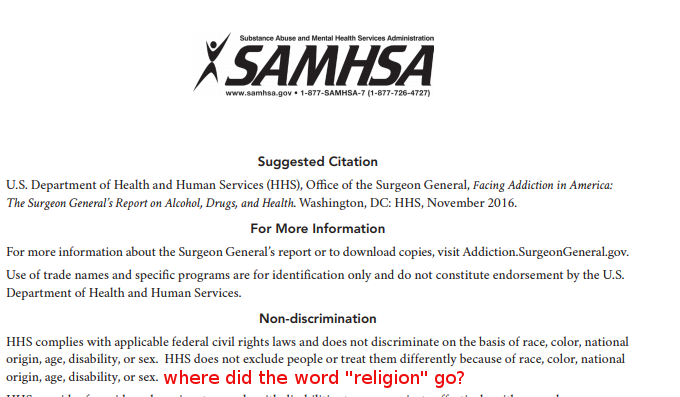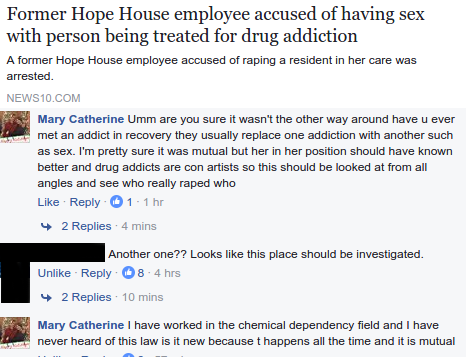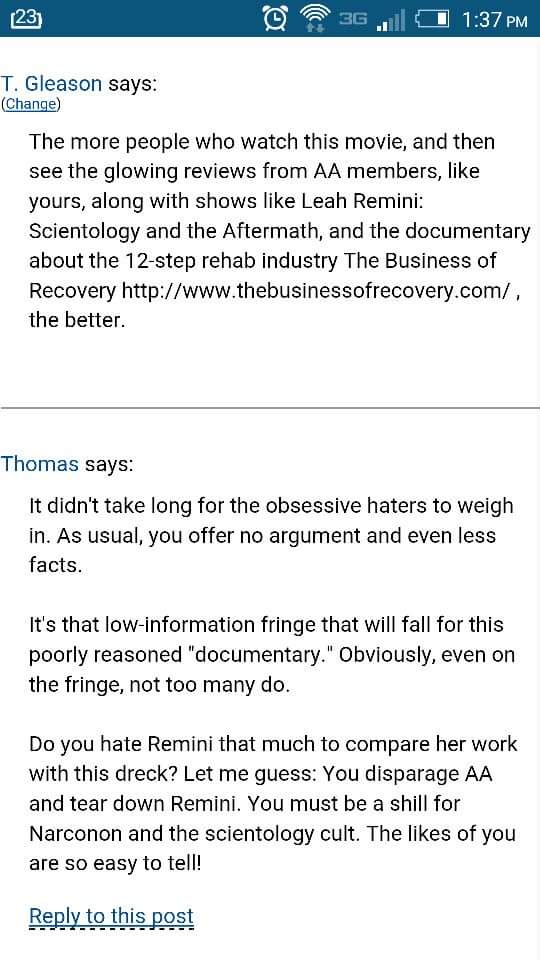Here’s a 23 minute interview with Monica Richardson at the Berlin Film Festival about her documentary exposing the AA cult.
Category Archives: Alcoholics Anonymous
Disrupted Physician
Disrupted Physician is one of my favorite whistleblower sites. Michael Langan is exposing nationwide fraud in Physicians Health Programs, and his work has inspired many other doctors and nurses subjected to medical license extortion to speak up and speak out against irrational authority — a pretty hot topic these days!
His case involves fraudulent drug test results and suppression of evidence in addition to the clear Establishment Clause violation described in this document: BRM_and_PHS_Must_Offer_Secular_Alternatives_to_AA_NA_in_Disciplinary_Contracts.pdf.
Marty Mann and the Disease Theory
Here’s a really interesting article in The Atlantic about how Marty Mann promoted the disease concept of addiction in order to get doctors to promote AA.
“Mann’s reply to Armstrong was both fascinating and revealing. She agreed with Armstrong regarding the inefficacy of conventional medicine regarding alcoholism; she also vouchsafed her commitment to AA and its less-than-generous opinion of conventional treatment enterprises. “Not that I, as a dyed-in-the-wool AA,” she wrote to Armstrong in reply, “believe that clinics, or any other medical or psychiatric means can straighten out very many “alkies” (although I know it can in some instances, here and there) but I do believe that the average individual will more readily go into a clinic to find out what to do for what ails them than they will investigate a layman’s organization such as ours [AA]. And also I believe that the very presence of a clinic will emphasize and advertise to the uninitiated that alcoholism is a disease which is to be treated, not hidden or punished.”
And here is a fascinating intellectual history of addiction as disease, Addiction as Accomplishment: The Discursive Construction of Disease by CRAIG REINARMAN —
“In 1942, the Alcoholism Movement was founded by Marty Mann, a public relations executive and former ‘‘drunk’’, and others. By 1944, she joined with Dr. E.M. Jellinek at Yale to create an organization whose purpose was to popularize the disease concept by putting it on a scientific footing. Note the chronology: science was not the source of the concept but a resource for promoting it. This organization later became the National Council on Alcoholism (NCA). Their goal was to create a new ‘‘scientific’’ approach that would allow them to get beyond the old, moralistic ‘‘wet’’ versus ‘‘dry’’ battle lines of the Temperance and Prohibition period (Roizen, 1991). While there were a few scientists doing research on alcohol in the 1930s, the bulk of the scientific research that Mann and her allies hoped would be the basis for their new disease concept had not yet been done. Indeed, they hoped the NCA would generate contributions needed to fund that research. The 1942 ‘‘Manifesto’’ of the Alcoholism Movement clearly stated that they sought to ‘‘inculcate’’ into public opinion the idea that alcoholics were ‘‘sick’’, and therefore ‘‘not responsible’’ for their drinking and its consequences, and were thus deserving of medical treatment (Anderson, 1942; Roizen, 1991; Room & Collins, 1983).”
More Misuse of OASAS Money to Promote 12-Step Goals
If you follow OASAS’ Facebook feed, you’ll see that they are constantly promoting and funding Alcoholics Anonymous-based rehabs and “outreach” programs. This is most likely illegal and the public needs to know that OASAS is suppressing informed consent when they do this, not to mention violating the First Amendment by using government funds to establish religion.
Impact of Federal Court Decision Concerning Alcoholics Anonymous On Government Funded Providers
Here’s a recent one: NEW YORK OASAS LAUNCHES NEW INITIATIVE TO HELP CONNECT MORE NEW YORKERS TO ADDICTION SERVICES IN NEW YORK CITY
What they don’t mention is that this is going to promote this 12-step agenda. Notice “favorable outcomes, such as increased participation in 12-step meetings”, as if that is the REAL goal via abstinence. This proves that it is Twelve Step Facilitation with 2 goals: acceptance of powerlessness, and surrender to God (the stated goals of TSF)
“There isn’t a lot of research in the field of recovery, Provet admitted. But there is still evidence that promoting some of its components is effective in preventing relapse. “Although quantitative research on the overall efficacy of recovery coaching and personal recovery plans is sparse, many of its components and effects have been researched and supports using this approach with our target population,” said Provet, citing in particular the work of Bill White. “Recovery coaches, 12-step programs, spirituality, and social and community support are integral to sustaining recovery. Increased goal-oriented thinking was positively correlated to length of time abstinent, quality of life, and self-efficacy,” he said. Maintaining motivation and self-efficacy for abstinence and increasing active coping post treatment were predictive of more favorable outcomes, such as increased participation in 12-step meetings.
“Asked how long people will stay in the recovery support program, Provet said the goal will be for each mentee to receive services over a period of six to 12 months to accomplish the goals set forth in the individual recovery plan. “Accomplishing each goal will, over time, build each mentee’s recovery capital to help sustain their recovery,” he said. “Our goal is also to provide each mentee, based on their progress in their recovery, with the opportunity to become mentors in the OHROCS program further sustaining their recovery support, this time through their mentoring of others in early recovery.”
Gamblers Anonymous meetings, NYCPG Funded by the State
“Problem gambling education also will be provided to patients at these six ATCs [Addiction Treatment Centers]. Several ATCs also have established connections with local Gambler’s Anonymous (GA) chapters, who will provide GA meetings on site at the ATCs.”
You can now go in to ‘treatment’ for substance use disorder and come out powerless over gambling, or at least telling everybody you know that they might be.
NYS OASAS ANNOUNCES EXPANSION OF SERVICES FOR NEW YORKERS STRUGGLING WITH PROBLEM GAMBLING
Here’s why that’s probably illegal Impact of Federal Court Decision Concerning Alcoholics Anonymous On Government Funded Providers
HHS Office for Civil Rights Policy loses its “religion” — or — This is is not the kind of “oversight” the rehab industry needs
Hello,
In Surgeon General Murthy’s report on Facing Addiction, I noticed that the word “religion” was not used in OCR’s notice.
The word “sex” WAS in this notice, but not “religion”, so the decision to leave “religion” out might be slightly more certain than:
last year after having no luck in getting New York state *at any level* to acknowledge precedented Establishment Clause violations (religious coercion) in 12-step treatment, I received a similar response from Sarah Brown, Deputy Director, where the wording was changed to “under certain circumstances, sex and religion“ [are protected].
This was not the response I expected, because on the OCR website where I initially filed my complaint, it says “religion” on the complaint form.
My question is: Under what circumstances is discrimination based on religion allowable, and is “addiction treatment” one of those circumstances? It does seem to be, based on the notice in the Facing Addiction report. If so, why?
Does it have anything to do with the 12-step programs, which the same notice says are not specifically endorsed by HHS?
—-
“Thank you for contacting the U.S. Department of Health and Human Services, Office for Civil Rights (OCR). Please note that OCR has limited jurisdiction to investigate complaints alleging discrimination on the basis of religion. This jurisdiction depends on the particular program and the funding source to pay for the program.”
Me: “Thank you for your response. Are there any documents I can read regarding OCR’s jurisdiction, such as which funding sources prohibit discrimination on the basis of religion and which ‘particular programs’ might be exempt from investigation? “
“This information is not on OCR’s website and is not available to the public. It is information that is used in OCR’s investigation process.”
Me: “Is it available via a FOIL request?”
“You can request anything under FOIA, but it is likely that the request would be denied because it is part of OCR’s investigative process.”
Me: “Thank you. Perhaps you could answer about a specific situation with NYS OASAS funding Gamblers Anonymous indoctrination in the course of substance abuse treatment, or using Gamblers Anonymous meetings on site, or funding the non-profit organization called the Council for Problem Gambling which promotes GA meetings and OASAS state-run GA-based rehab.”
“I don’t investigate complaints or have access to the information to make this determination. If you have further questions regarding your complaint, it should be directed to OCR’s Central Intake Unit which investigate your complaint.”
Plausible deniability
Alcoholics Anonymous lives in a state of ‘plausible denial’.
AA is not ‘technically’ responsible for anything, most especially the unfortunate circumstances or deaths of tradition violators.
AA isn’t a person; how can AA be responsible? No individual technically speaks for AA. AA is technically not the Big Book, technically not the meetings, not technically its members or its board, not technically the 12-steps, technically not a religion, technically not ‘treatment’, while also technically not medical fraud, and the Surgeon General technically doesn’t promote it, Twelve-Step Facilitation is technically not AA, the Oxford Houses and 90% of the rehab industry is not technically AA. The New Recovery Advocacy Movement is not technically AA either, and NYS OASAS technically is not an AA front group.
“Plausible deniability is the ability for persons (typically senior officials in a formal or informal chain of command) to deny knowledge of or responsibility for any damnable actions committed by others (usually subordinates in an organizational hierarchy) because of a lack of evidence that can confirm their participation, even if they were personally involved in or at least willfully ignorant of the actions. In the case that illegal or otherwise disreputable and unpopular activities become public, high-ranking officials may deny any awareness of such acts in order to insulate themselves and shift blame onto the agents who carried out the acts, as they are confident that their doubters will be unable to prove otherwise. The lack of evidence to the contrary ostensibly makes the denial plausible, that is, credible, although sometimes it merely makes it unactionable. The term typically implies forethought, such as intentionally setting up the conditions to plausibly avoid responsibility for one’s (future) actions or knowledge. In some organizations, legal doctrines such as command responsibility exist to hold major parties responsible for the actions of subordinates involved in heinous acts and nullify any legal protection that their denial of involvement would carry.”
-wikipedia
Journal of the AMA 1939
“JOURNAL OF THE AMERICAN MEDICAL ASSOCIATION
Vol. 113(16), October 14, 1939
ALCOHOLICS ANONYMOUS. The story of how more than one hundred men have recovered from alcoholism. Cloth. Price $3.50. 400 pp.. New York: Works Publishing Company. 1939.
The seriousness of the psychiatric and social problem represented by addiction to alcohol is generally underestimated by those not immediately familiar with the tragedies in the families of victims or the resistance addicts offer to any effective treatment. Many psychiatrists regard addiction to alcohol as having a more pessimistic prognosis than schizophrenia. For many pears the public was beguiled into believing that short courses of enforced abstinence and catharsis in “institutes” and “rest homes” would do the trick, and now that the failure of such temporizing has become common knowledge, a considerable number of other forms of quack treatment have sprung up. The book under review is a curious combination of organizing propaganda and religious exhortation. It is in no sense a scientific book, although it is introduced by a letter from a physician who claims to know some of the anonymous contributors who have been “cured” of addiction to alcohol and have joined together in an organization which would save other addicts by a kind of religious conversion. The book contains instructions as to how to intrigue the alcoholic addict into the acceptance of divine guidance in place of alcohol in terms strongly reminiscent of Dale Carnegie and the adherents of the Buchman (“Oxford”) movement. The one valid thing in the book is the recognition of the seriousness of addiction to alcohol Other than this, the book has no scientific merit or interest.”
It then took Marty Mann and NCADD, and coercive EAP programs to promote the ‘disease model’ and gain acceptance by doctors who proceeded to be abused by their own EAPs. Here is a timeline showing what happened after this book review. NCADD History
Two Hope House Employees in Albany New York Arrested for Allegedly Having Sex with Drug Rehab Clients
Well… It’s good to hear from an insider that it happens all the time! :-/
Two Hope House employees were arrested and charged with raping clients last week. In response to these articles, I came across a chemical dependency services worker claiming that this is very normal in the chemical dependency field. This is not surprising; there have been two movies detailing serious ethical concerns (PDF) about the industry in just this last year: The 13th Step and The Business of Recovery. It’s even more complicated, she says, because “addicts are con artists”, suggesting that any ‘mutual’ sex between an addict and a professional is the “addict’s” own plot to destroy the professional. The New York State Supreme Court seems to agree with this view that an OASAS worker accused of serial sexual misconduct is probably an innocent victim of clients’ and co-workers’ symptomatic behavior.
But anybody looking at the laws and her reasoning behind why this woman said it’s pretty normal to have sex with a client — they “go to meetings together” and have “that bond” and it’s “mutual” — would say that it’s insane that someone who’s worked in this field for a long time would have never even heard of the idea that this is illegal, or that it is her duty to be concerned about it.
It would seem pretty crazy, unless, of course, they knew that Office of Alcoholism and Substance Abuse Services employees traditionally lack required basic social work training and education, and that OASAS likes it that way. That being the case, it’s not much of a stretch to think that organizations accredited by OASAS, like Hope House, would have a pretty low bar for training of employees.
You can sign the petition to make health workers aware of the problems with the culture of Alcoholics Anonymous.
Now I’m a Shill for Scientology
Some of these reviews for the 13th Step documentary are pretty out there. This guy isn’t even a Verified Purchase so it’s quite possible he didn’t even watch the movie. It’s very tough to get AA sympathizers to actually watch it before they say it’s worthless. (I bought a copy for Samaritan Counseling, considering it’s about their ‘preferred treatment’, but I didn’t even get a thank you note.)
I’m not a shill for Scientology but I do know that Scientology’s Narconon and AA’s good samaritans and the Salvation Army all compete for the fraudulent drug rehab market.
What a typical uninformed accusation for AA members to make! They automatically assume that AA critics are selling some competing snake oil and jump to attack the character of the critic.




